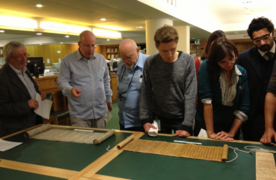The Xiabuzan (Chinese: 下部讚[1]) is a Chinese Manichaean hymn scroll found by British archaeologist Aurel Stein in the Mogao Grottoes. It contains a series of hymns used in religious ceremonies. It is currently held at the British Library, where it is catalogued as number S.2659.[2][3]
| Xiabuzan | |
|---|---|
| Material | paper |
| Writing | Middle Chinese |
| Created | Tang Dynasty |
| Discovered | 1907 in Dunhuang Mogao Caves Buddhist scripture cave |
| Present location | LondonBritish Library |
| Identification | S.2659 |

Introduction
editThe first volume of the manuscript is slightly incomplete, and the content is written in the form of poetry. Among them, there are 1254 sentences of seven-character poems, and a few four-character and five-character poems.[4] According to Lin Wushu's research, these hymns were translated from a Middle Iranian language, rather than original by the Manichaeans.[2] Many of the contents are dedicated to the Yishu (Jesus), and the hymn to the highest deity of Manichaeism.[5]
In the 'Praise Jesus' text
editAfter Manichaeism was introduced into China, because the image of Jesus was quite unfamiliar to Chinese culture, missionaries combined it with Buddhist imagery, called Jesus Buddha, and made him a model of great mercy and relief.[6] Therefore, believers wrote in the following excerpt from the hymn "Praise Jesus Text", which is like a Buddhist scripture in the Chinese Manichaean hymn scroll.
|
See also
editReferences
edit- ^ Rault, Lucie (2018). L’Hymnaire manichéen chinois Xiabuzan 下部讚 à l’usage des Auditeurs. Nag Hammadi and Manichaean Studies (in French). Vol. 94. Leiden: Brill. ISBN 978-90-04-38026-4.
- ^ a b 林世田 (2011). "國家圖書館藏《摩尼敎經》的文獻價値" (PDF). nlc.cn (in Simplified Chinese). Archived (PDF) from the original on 2020-11-04. Retrieved 2020-05-24.
- ^ Sims-Williams, Ursula (2013-09-23). "Some Syriac Manichean Treasures in the British Library". blogs.bl.uk. Archived from the original on 2020-11-04. Retrieved 2020-05-24.
- ^ "唐寫本《摩尼敎經》" (PDF). nlc.cn (in Simplified Chinese). 2011. Archived (PDF) from the original on 2020-11-04. Retrieved 2020-05-24.
- ^ 王媛媛 (2017-07-31). "唐代漢文摩尼敎資料所見之「法王」". nxkg.org.cn (in Simplified Chinese). Archived from the original on 2020-11-04. Retrieved 2020-05-24.
- ^ Gong, Fangzhen (2012-08-01). 融合四方文化的智慧 (in Chinese). 新潮社文化出版. ISBN 978-986-316-114-1.